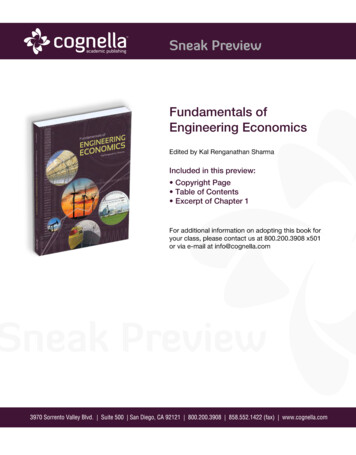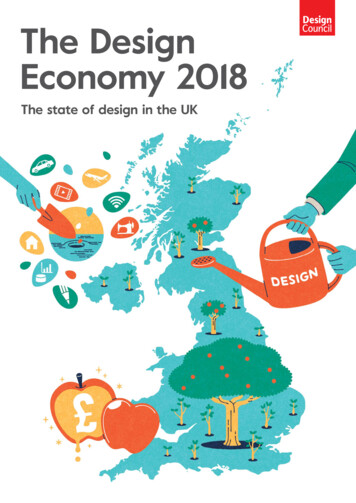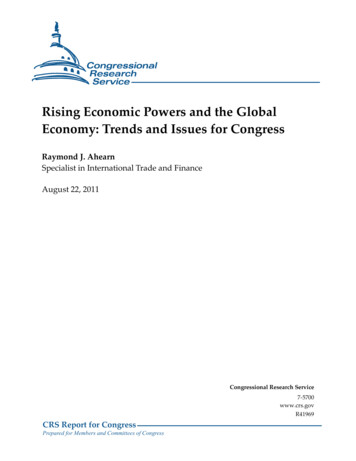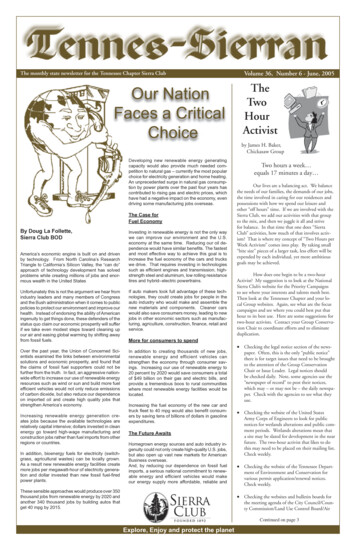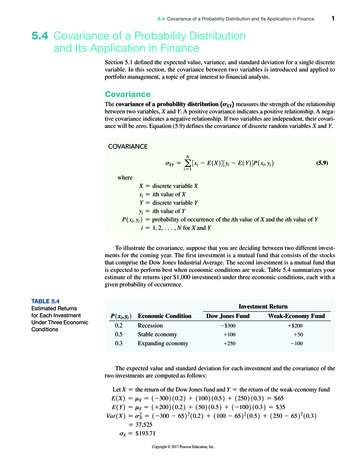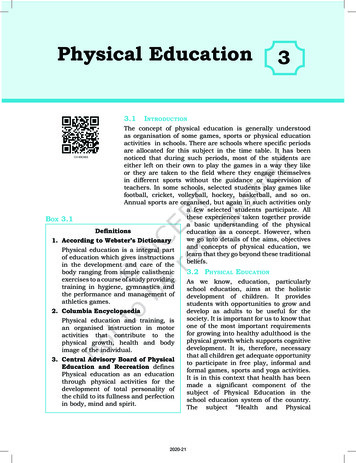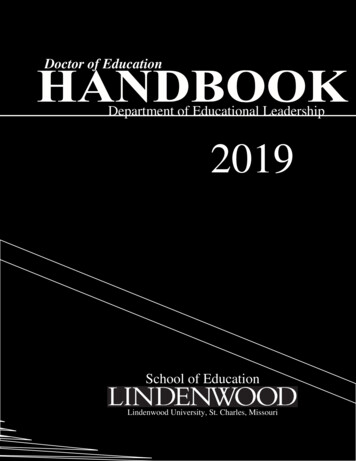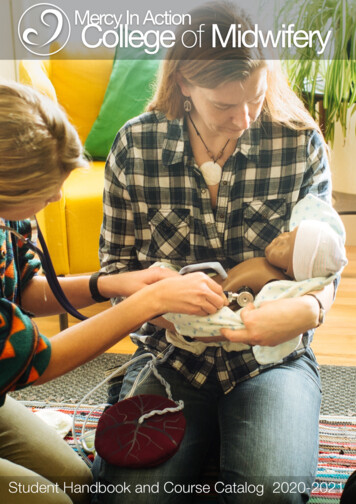
Transcription
TheEducationEconomyTeaching tomorrow’sbusiness leaders today2011 Annual Report2011 NFTE Annual Report1
Since 1987, the Network for Teaching Entrepreneurship (NFTE) has beeninspiring young people to pursue educational opportunities, start their ownbusinesses, and succeed in life.By providing entrepreneurship education programs relevant to the real world,NFTE empowers students to own their educations in and out of the classroomand to find their own paths to success. Hundreds of thousands of low-incomestudents have discovered entrepreneurship opportunities via thousands ofcertified educators worldwide. NFTE supports active programs in 10 countriesaround the world through our network of offices and partners. Entrepreneursare a powerful driver of economic growth, and NFTE sows the seeds ofinnovation in students at home and abroad.To learn how you can help students realize their potential, visit www.nfte.com.2
ContentsA Message from NFTE’s Leaders2Filling a Critical Need3NFTE at a Glance52011 Highlights6Hayley Hoverter: Envirocapitalist7Kern Williams: Community Builder9PingXin Dong: Inspirational Leader102011 Donors112011 Financials132011 NFTE Annual Report1
a messagefrom nfte’sleadersToday, the two greatest challenges facing our nation and the world arecreating a healthy economy and preparing young people to thrive in that economy. Here at the Network forTeaching Entrepreneurship (NFTE) we do both. We bring the business world into the classroom, strengtheningthe fundamental connection between education and economic prosperity by introducing young people toentrepreneurship early.Education is the ticket to success. Yet high school students continue to drop out at staggering rates, limitingnot only their own potential but also society’s. The future depends on a plentiful supply of educated, creative,entrepreneurial citizens to create new businesses and jobs.That’s why NFTE aims our programs at low-income students, recognizing the entrepreneur in each one. Ourcurriculum excites young people around the world about learning, urges them to commit to school, andengages them in the business world by tying academics to something everyone can understand — makingmoney. They learn about buying, selling, profits, and loss as part of a rigorous experiential curriculum alignedwith many educational standards. But perhaps more importantly, they learn confidence and poise, respect andprofessionalism, and the creative power of their own ideas.NFTE had a banner year in 2011. We taught more than 43,000 young people about entrepreneurship, morethan half of those overseas. We launched a new digital network to offer just-in-time professional resources toour teachers. We shared our mission with national and global audiences, joining White House initiatives onbusiness and finance, participating in a panel with the Clinton Global Initiative, contributing to the HuffingtonPost, and participating at the World Economic Forum in Davos, Switzerland for the 10th year in a row. And wehave built bipartisan support for entrepreneurship education in Congress, successfully working to incorporateentrepreneurship education into a financial literacy bill linked to the re-authorization of the Elementary andSecondary Education Act. Such legislation would offer federal dollars to states that include entrepreneurshipin middle and high school curricula. NFTE also worked to unite a consortium of more than a dozen nonprofits,businesses, universities, public officials, and others to sign a letter in support of entrepreneurship education.But regardless of the audience or project, our vision remains the same: Every young person will find his or her ownpathway to success. NFTE is dedicated to improving the lives of young people from challenging circumstancesthrough entrepreneurship education. The natural entrepreneurial drive of young people remains at the heart ofwhat we do, and this report highlights the inspirational stories of several current and former NFTE students. Everystudent has amazing potential. We just help each one harness it.A big thank you to all our supporters — teachers, donors, volunteers, board members, and staff — who make thisimportant work possible. Because of you, we are changing lives.Landon HilliardChairman, National Board of Directors2The Education EconomyAmy RosenPresident & CEOSteve MariottiFounder
Filling aCriticalNeedA NFTE student selects wholesale goods to purchaseas part of the buying and selling activity.Connecting Educationto the EconomyThe Network for Teaching Entrepreneurship (NFTE) fills a uniqueand critical educational need, teaching low-income studentsworldwide the entrepreneurial mindset and business fundamentals.We empower young people to succeed in school and take chargeof their futures by integrating coursework with the practicalities ofearning money through ownership.“The president should also vow to bring theNetwork for Teaching Entrepreneurship, orNFTE, to every low-income neighborhood inAmerica.”Founded in New York City in 1987 by Steve Mariotti, a formerentrepreneur turned high school teacher in the South Bronx,NFTE began as a program to improve academic performanceamong students at risk of failing or quitting school. Steve linkedhis business background with his desire to teach underservedstudents and discovered that when young people from lowincome communities are given the opportunity to learn aboutentrepreneurship, academics become relevant to the real world.To date, NFTE has worked with nearly 400,000 young people fromlow-income communities in programs across the United States andaround the world.— Thomas Friedman, The New York Times, Jan. 23, 2010In today’s complex global economy, high school graduation is theessential first step on the path to success — and yet nearly onethird of all American high school students don’t earn a diploma. Theoutcomes are even more discouraging for students of color: halfof all African-American, Latino, and Native American high schoolstudents don’t graduate. Without an education, young people livingin poverty struggle to succeed and find hope in their futures.NFTE students market and sell products to classmates, working tomake a profit during the buying and selling activity.Inspired by Hands-on LearningTeenage semifinalists from NFTE’s 2010 National YouthEntrepreneurship Challenge and NFTE CEO Amy Rosen ring theopening bell at the New York Stock Exchange.By introducing students to basic business concepts, NFTE sparksa connection between the math lessons of the classroom andthe balance sheets of the boardroom. NFTE’s award-winning,customizable curriculum engages students in experiential learningbased around four big ideas: creative thinking, market research,sales and marketing, and business and financial fundamentals.Teachers lead engaging activities, from a lesson on free trade inwhich students barter paper bags of items from the dollar store,to an analysis of magazine advertisements to teach audiencesegmentation.2011 NFTE Annual Report3
A centerpiece of the program is the buying and selling exercise:The activity, which includes negotiating with wholesalers, buyingproducts to sell to classmates, and marketing their wares, “reallygives students an opportunity to apply the concepts that they’relearning to something that’s tangible,” said Rupa Mohan, NFTE’svice president of programs who oversees teacher training andprofessional development.Instead of simply reading about business in a textbook or solvingmath problems, students are challenged to pitch their startupideas, earn money, network with mentors, and win investorsthrough local and national entrepreneurship competitions.Every student’s NFTE experience culminates in crafting a businessplan for his or her own unique concept and presenting that plan ina classroom business plan competition.NFTE serves close to 50,000 disadvantaged young people annuallythrough a network of NFTE offices and partner programs in 17 U.S.cities and nine foreign countries.Guided by Expert Teachers and MentorsNFTE teachers undergo four days of training — dubbed NFTEUniversity — and receive extensive professional support toguide NFTE students in hands-on activities such as touring localbusinesses. Lessons align with the new Common Core StateStandards in math, and teachers can share ideas with one anotheron NFTE’s new digital network, Connect. The program integratesvisits from guest speakers and active assistance from volunteerprofessionals who serve as students’ business coaches.By bringing in local business people, NFTE gives studentsprofessional feedback on their business plans, Mohan said.“It’s another way we bridge the business community and theclassroom.”“Learning business is like learning a new language,” she added.“You want to be able to apply your knowledge in the real world.”Preparing young men and women for tomorrow’s careers throughpractical, rigorous business experiences makes sense in today’sstruggling economy. With U.S. unemployment hovering around9 percent, small businesses promise to be the driver of futureeconomic growth — and NFTE is capturing the imaginations offuture entrepreneurs. Our program excites students by allowingthem to develop a product, service, or idea they are passionateabout, which motivates them to finish their studies. More thanthat, it gives them the confidence and tools they need to thrive inthe workplace. NFTE instills an entrepreneurial mindset in the nextgeneration.EntrepreneurshipA way of thinking and acting that isopportunity focused, holistic in approach,and leadership balanced.TeacherSpotlight:Gerard CusackGerry Cusack has taught entrepreneurship and financial literacy in Limerick,Ireland for three years through NFTE’s Irish partner, Foroige. At LimerickYouthreach, he works with learners who struggle with numeracy and literacy,and behavioral and developmental issues. By introducing his students tobankers, educators, and mentors, Gerry connects them to a world they couldn’totherwise access. He credits NFTE for helping his students assess their skills,prepare for life, and communicate their goals.“The kids I work with — all early school leavers aged 15 to 20 — come from the most marginalizedsections of Limerick,” Cusack said. “But that doesn’t mean they don’t have innate talent, vitality, andstreet smarts — admirable qualities that they don’t know how to channel. That’s where NFTE comes in.We harness their raw energy, help them learn skills, and build their confidence.”4The Education Economy
Founded: 1987AT A GLANCENFTE curriculumEntrepreneurial thinkersExperiential activitiesNFTE trained teacherNFTEStudentsHigh school graduatesCollege studentsBusiness ownersBusiness volunteersWorkforce of tomorrow 13 millionStudents servedNearly 400,000 worldwideAnnual budget81 Teachers trained5,000 across 50 countriesShare of every dollar raised byNFTE spent directly on programsNFTE’s Global field Co., CT/Westchester Co., NYFresno, CAKansasLos AngelesNew EnglandRegionNew York City MetroPhiladelphiaPittsburghSan FranciscoBay AreaSouth CarolinaSouth FloridaWashington, biaNewZealandChile NFTE Office NFTE Partner ProgramWhy does teaching entrepreneurship matter?1 in 381%The number of U.S. high school students whodrop outShare of high school dropouts who say they wouldhave graduated if school were relevant totheir livesALL 250,000net new jobs in the United States over the last30 years can be fully attributed to startupsAverage lifetimeearning differentialbetween high school graduates and dropouts2011 NFTE Annual Report5
2011HighlightsIn 2011, NFTE continued togrow, nurturing more studententrepreneurs and highquality teachers than ever.We developed new digitaltools, launched exciting newprograms, strengthened ourNFTE’s 2010 National Youth Entrepreneurship Challenge Finalists and NFTE CEO Amy Rosenmeet President Barack Obama in the Oval Office.curriculum, expanded ourresearch, and forged powerful new partnerships.Most important, we continued inspiring lowincome students by providing opportunities tomake their creative business ideas a reality.Highlights included:n Having the winners of NFTE’s 5th annual National YouthEntrepreneurship Challenge meet with President Barack Obamaat the White House.n Welcoming MasterCard Worldwide as NFTE’s largest corporateinvestor supporting classroom programs and teacherdevelopment across the United States and in Belgium.n Celebrating NFTE partner Bright China Foundation, whichwas voted the best charity project in China by the Beijing CivilAffairs Bureau and the Capital Philanthropy Foundation.n Collecting data from students in Baltimore and Miami indicatingthat participating in NFTE helped improve reading and mathscores and school attendance, and encouraged critical thinking,leadership, and career planning.n Expanding our relationship with Ernst & Young, including NFTEstudents being honored at the company’s regional EntrepreneurOf The Year award events and having Ernst & Young partnerson almost all NFTE Regional Boards in the United States.n NBA legend and entrepreneur Earvin “Magic” Johnsonappearing at the NFTE Dare to Dream Gala in New York City asa guest of Ernst & Young.6The Education Economy“Small businesses will drive the globaleconomy. NFTE provides the critical hands-onexperience and skills young people need tobe tomorrow’s entrepreneurs.”— Patricia Devereux, MasterCard Worldwide’sGroup Head of Corporate Philanthropy & Citizenshipn Roozt.com founder Brent Freeman piloting a socialentrepreneurship curriculum with 32 NFTE students atDowntown Magnets High School in Los Angeles.n Tabulating the 30,000 votes cast in NFTE’s inaugural onlineElevator Pitch Challenge presented by E*TRADE.n Helping kick off the White House’s Startup America Initiativewith NFTE alumna Zoë Damacela, a fashion designer studyingat Northwestern University.n NFTE President & CEO Amy Rosen serving on the President’sAdvisory Council on Financial Capability.n Aligning our award-winning textbook Entrepreneurship:Owning Your Future, 11th Edition, to the Common Core StateStandards for middle and high school math.n Collaborating with Sen. Kay Hagan to include entrepreneurshipeducation in her financial literacy bill.
HayleyHoverterEnvirocapitalistHayley Hoverter’s business idea was hatched earlier than most: atage six, in a Starbucks. The Los Angeles high school student usedto accompany her mother on her early morning shift opening thecoffee shop. Even then, among the slick professionals grabbingtheir pre-work lattes, Hayley noticed the stream of garbage bagsbursting with empty cups and lids and was particularly struck bythe number of empty sugar and sweetener packets strewn aroundthe store.Though Hayley had never imagined herself pursuing business,she enrolled in the Downtown Magnets High School’s Academyof Finance at her parents’ urging. Determined to launch a sociallyresponsible business, she took a social entrepreneurship courseled by NFTE teacher Michael Jaquias and designed by Roozt.comfounder Brent Freeman. The class was a revelation, and Freemanbecame a mentor to the 16-year-old.“We got to meet so many entrepreneurs and hear their stories,”Hayley said. “I remember being so fascinated about how theycould have started from nothing they basically made theirfutures. That spoke volumes to me as a high schooler and someonewho didn’t know what she wanted to do.”“NFTE really opens our eyes definitely beyondour high school doors. The mentors arejust fantastic. They’re extremely, extremelydedicated to see you succeed as a person,not only in business.”— Hayley HoverterA New Product is BornAfter discarding an initial idea for waterless soap, Hayley foundher inspiration: Sweet (dis)SOLVE, soluble rice paper sugar packetsthat melt directly into hot coffee or tea. The packets themselves areorganic, odorless, and colorless, with no calories, no taste — andmost important — no waste.Sweet (dis)SOLVE could potentially eliminate the trashing ofapproximately 4,800 paper sugar and sweetener packets used bya single Starbucks store in a week, equivalent to about 8 millionpounds of garbage per year. Conservation is a cause Hayley has longbeen passionate about, joining the environmental club at school andvolunteering to help clean up Southern California beaches.GRADUATEPROFILE2011 National Youth EntrepreneurshipChallenge winner Hayley Hoverter inTimes Square.In developing the environmentally friendlyproduct, the shy Hayley overcame hernerves to find her voice, presenting her ideato classmates, pitching her business planto coffee shop owners, and explaining herconcept to audiences at the TEDx conference.“Hayley is actually a very quiet young lady,” Freeman said. “I don’tthink presentations were something she felt comfortable with.”But with practice and the support of NFTE mentors, she gainedconfidence, Freeman added: “She’s so articulate about her idea.”Sweet SuccessHayley won the NFTE Los Angeles’ business competition in June;then Freeman and other mentors helped her develop her planfurther and prepare for NFTE’s national competition. Rather thanlounging poolside, Hayley spent her summer vacation applyingfor a patent for her soluble sugar packets and attending anentrepreneurship course at the University of Southern California.“Over my summer I really did nothing but eat, drink, and sleepbusiness,” she said.Since first developing the idea as a sophomore in 2010, Hayley haswon not only NFTE’s regional award, but also the top 10,000 prizein the organization’s National Youth Entrepreneurship Challengethis past October. Judge Daymond John, founder and CEO of FUBUand star of the reality show “Shark Tank,” offered to invest 5,000in Sweet (dis)SOLVE on the spot. Now, John is advising Hayley tohelp develop a prototype and analyze the product’s feasibility, aswell as introduce her to potential contacts and investors.“This experience,” she said, “helped me discover myentrepreneurial spirit.” Although she’s not exactly sure whereSweet dis(SOLVE) will take her, Hayley hopes the product mighthelp pay for college; she has her sights set on Columbia Universityor the Massachusetts Institute of Technology.Hayley remains grateful to NFTE for offering her a new, unexpectedexperience. The program “really opens our eyes definitely beyondour high school doors,” she said. “I just feel really lucky that I wasable to seize the opportunity and be a part of it.”2011 NFTE Annual Report7
VolunteerSpotlight:Reco C. CollinsReco C. Collins, a Vice Presidentof Public Finance at PNC Bank,is NFTE’s 2011 Lowell B. MasonVolunteer of the Year and has beenserving NFTE Baltimore for fiveyears.He has spent time as a business coach in the classroom,judged the NFTE Baltimore business plan competition,helped secure guest speakers, and coordinated other NFTEvolunteers.“Having beensomeone from alow socioeconomicenvironment, beingable to go back andinteract with thesekids who are so muchlike myself when Iwas a kid, it’s veryrewarding,” Collinssaid.In 2011, NFTE launched a newsummer program to help ambitiousstudents take their entrepreneurialideas one step further. Start UpSummer allows students age 16 andup who have already created an indepth business plan through their NFTE course during theschool year to jumpstart their enterprises with capital andoutside expertise.Start UpSummerThe New York City pilot launched this summer with“Ignition Week,” a business boot camp at ColumbiaUniversity in which 16 participating students set goals,analyzed case studies, and began developing marketingmaterials such as business cards and flyers. They alsoreceived laptops with useful software; at the heart of theprogram were the close relationships student forged withtheir business coaches. Many students reported with pridehow hard they worked during Ignition Week, packing ayear’s worth of learning into seven days.“I tell the students Icoach that the sky’sthe limit — don’t letanyone deter you fromyour goals.”Start Up Summer participants join in a team buildingactivity in Central Park.Working on an intense timetable, the young businessowners met twice a week for six weeks. They also workedto sell their products or services, heard from guest speakers,and made formal presentations on their progress at thesummer’s end. Students are continuing to meet with NFTEstaff and business community volunteers throughout theschool year to keep their businesses going.The program aims to teach highly motivated studentsboth technical skills, such as Excel, and interpersonal skillssuch as networking, public speaking, and communicatingprofessionally. After this year’s successful launch, NFTEhopes to expand Start Up Summer to more cities andstudents.NFTE alumni create a batch of J&W Sensations Lotion.8The Education Economy
KernWilliamsCommunity BuilderAs a teenager growing up as the youngest of four siblings inthe Roslindale section of Boston, Kern Williams was rebellious.The Trinidad and Tobago native was smart but uninterested inschoolwork. He was failing his classes, occasionally breaking thelaw, and missing so many days of school he was barred fromplaying on the basketball team. His mother, who raised Kern andhis brother and two sisters alone, worked multiple jobs to keepthe family afloat. Kern recalls her disappointment that he waswasting his potential. Then, five years ago, Kern took part in NFTE’sentrepreneurship class during his junior year at Brighton HighSchool — and his life began moving in a different direction.“I fell in love with entrepreneurship,” he said, “which mademe eager to go to school.” His NFTE coursework pushed himto become more studious, and failing grades transformed intohonor roll marks. He created a business plan for an errand servicefor aging adults. He devoured inspirational business books,like Reallionaire by Farrah Gray and The 21 Irrefutable Laws ofLeadership by John C. Maxwell. At the end of his junior year, Kernwas named Brighton High’s Entrepreneur of the Year. The yearbrought dramatic growth and change.“The spark I saw in his eye was one that changed his way ofthinking,” said Kern’s entrepreneurship teacher, petite dynamoMonica Smalls.“NFTE put me on a path to prosperity; there’sno other way to say it. Quite simply, NFTEsaved my life.”— Kern WilliamsNow 24, Kern agrees: “I started viewing myself as a valuablecontributor to society with the skills and knowledge to make amajor impact.”Smalls, who Kern considers a surrogate mother, inspired him to seethe world “through a different lens,” finding creative solutions toproblems and being patient and kind with others, he recalls.GRADUATEPROFILENFTE alumnus Kern Williams worksin finance, is studying for a businessadministration degree, and mentors urbanyouth in Boston.“You knew that she cared about you,” Kern said of Smalls, whohas taught with NFTE for 16 years. “It’s not just, ‘Did you writeyour business description?’ but ‘How are you doing in life?’ Shecared about my future and made me care about myself.” In class,Kern also connected with his first mentor, Cedric Turner, whointroduced him to the business world, teaching him the importanceof networking — and how to tie a tie.“What really struck me was the practicality of the class,” Kern said.“You come from English class, you’re talking about Shakespeare— I don’t know if this is really relevant to my life. You come frommath, talking about geometry and acute triangles — I don’t knowif this is really relevant to my life. I go home sometimes, there’s nofood in my fridge With entrepreneurship class, I said ‘OK, that’ssomething I can use. You’re talking about making money, that’ssomething I can understand.’”Although Kern didn’t win NFTE New England’s regional businesscompetition, it hardly mattered; the young man knew he hadfound his passion. His friends began to notice his dedication andfocus, and his self-esteem soared.Once a gas station attendant, now Kern juggles a careerand school, working as an Income Specialist for State StreetCorporation while attending the University of MassachusettsBoston to study business administration. He also believes in givingback to his community, developing a mentoring program for urbanyouth in partnership with Big Brothers Big Sisters.“I believe now my focus shifts to playing a role in providing thatexperience for other urban youths. If I’m able to look back 40 yearsfrom now and say I helped restore hope in the lives of urban youth,I will have completed my mission.”And the confidence and drive NFTE helped instill in Kern has madehim a better father to his 4-year-old daughter, Emani. He’s eventeaching her business basics, helping her run a pretend cupcakestand when they play.“NFTE put me on a path to prosperity; there’s no other way to sayit,” Kern said. “Quite simply, NFTE saved my life.”2011 NFTE Annual Report9
PingXinDongInspirational LeaderPingXin Dong wasn’t born with opportunities. With NFTE’s help,he created them.At age 2, PingXin became ill with a 104-degree fever; his parentscould not afford treatment, and PingXin was left with cerebralpalsy. In spite of six surgeries, the young man’s left leg remainsbent, impairing walking.Throughout his childhood, PingXin felt self-conscious about hisuneven gait, and other children taunted him. He hid the bullyingfrom his parents, who run an eyeglass shop and farm, and feltashamed for years.PingXin’s self-image began to change with an entrepreneurshipclass by the Bright China Foundation, NFTE’s Chinese partnerthat promotes entrepreneurship. Balancing his studies with hisentrepreneurial aspirations, PingXin founded an online shop inJanuary 2009 that sells clothes, hats, shoes, bags, cosmetics, andeyewear to college-age consumers. Building his own business hasbuilt up PingXin’s confidence.“As poor as my health is, I never give up,” PingXin said.“The most precious wealth I own is theknowledge that persistence and practicelead to the biggest success.”— PingXin DongThanks to the skills and opportunities available through NFTEand Bright China, PingXin’s first venture was successful enoughfor him to open a second shop in July 2009 on the populare-commerce platform Taobao.com. The next year, PingXin openeda brick and mortar store on the third floor of a mall, integratingonline sales with walk-in business. He also sells products on sevenuniversity campuses. With this model, customers can browsehigh-quality products from PingXin’s Xin Peng Workshop online,leveraging the efficiency of e-commerce, and then choose toeither buy items virtually or examine physical merchandise in thestore.10The Education EconomyGRADUATEPROFILENFTE’s 2011 Daniel Treanor MemorialAward Winner PingXin Dong with hisproud father, HeCheng Dong.“People hope to buy quality products at low cost and are morerelieved if they can see the real product they have chosen,”PingXin said. “My workshop provides customers with a newexperience by searching for goods online and purchasing themoffline. It’s quite a different shopping model.”Although online shopping is still a tiny percentage of the Chinesemarket, 30 percent of PingXin’s business is virtual, with the rest inperson.Over the past two years, PingXin has been recognized for hisbusiness acumen, winning several prizes for entrepreneurship,including NFTE’s Daniel Treanor Memorial Award, which honorsstudents who have overcome health or physical challenges.Local media have written about him, and he is a member ofthe Young Entrepreneur Club of Changzhou City. In additionto being a businessman, the 21-year-old studies optometry andophthalmology at Changzhou Health College in Changzhou, nearChina’s eastern coast.Yet, “the most precious wealth I own is the knowledge thatpersistence and practice lead to the biggest success,” PingXinsaid.As Xin Peng Workshop grows, PingXin hopes to continue toimprove his customer service, expand his product offerings, andtrademark his own brands. And philanthropy is an importantpart of PingXin’s business model. He held a workshop to help100 students establish their own small businesses and donatedthe profits to disabled and out-of-work individuals to help themlaunch low-cost online shops.Through his accomplishments and affiliation with NFTE and BrightChina, “I believe in self-renewal, self-pride, and self-confidence,”PingXin said. “People must seize opportunities, meet challengesbravely, and work hard toward their goals.”“In my opinion, either failure or success is just one kind of result.Trying is the biggest success.”
2011 donorsEquity Investors ( 500,000 )Carson Family Charitable TrustMr. Timothy E. Donner / William H. Donner FoundationMegan J. EpsteinFreddie Mac FoundationGlobalHueMr. Kenneth C. GriffinLandon and Kiwi HilliardVenture Capitalists ( 200,000 )Internet Capital Group Operations, Inc.J. Willard and Alice S. Marriott FoundationThe MCJ Amelior FoundationOppenheimerFunds FoundationPeacock Foundation, Inc.Anthony ScaramucciState Street FoundationThe Harry and Jeanette Weinberg Foundation, Inc.Windsong TrustWilliam Zimmerman FoundationMrs. Kathryn W. DavisMary Myers Kauppila / Ladera FoundationMultinational Scholar Charitable Trust 1907Karen Pritzker and Michael Vlock / The Seedlings FoundationGrowth Investors ( 100,000 )Preferred Shareholders ( 25,000 )The Clark Charitable Foundation, Inc.CME GroupMr. Don ColemanMs. Kelli ColemanCommunities Foundation of TexasBank of AmericaMr. Joseph A. DiMennaCitiEntrepreneurs Source / Franchise Source Brands InternationalE*TRADE FinancialMr. Philip A. FalconeF. M. Kirby FoundationGeneral Electric Co.The Goldhirsh FoundationGrosvenor Capital Management, L.P.Goldman Sachs GivesThe JM FoundationGoogleJames Lyle and Tracy NixonJPMorgan Chase & Co.The M&T Charitable FoundationJohn S. and James L. Knight FoundationMagnetar Capital LLCNYSE Euronext FoundationMr. Joe MansuetoPitney Bowes, Inc.Lowell and Betty MasonRebecca and Arthur SambergMr. Stephen McDonnellSAP America, Inc.MWW GroupStarr International FoundationHe
n Aligning our award-winning textbook Entrepreneurship: Owning Your Future, 11th Edition, to the Common Core State Standards for middle and high school math. n Collaborating with Sen. Kay Hagan to include entrepreneurship education in her financial liter

